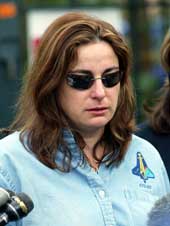 |
| Rona Ramon |
Houston, Feb. 3 (Reuters): Rona Ramon, the widow of Israeli combat pilot-turned-astronaut Ilan Ramon, told Israeli reporters late yesterday that her husband and the other six members of the shuttle Columbia crew “are all angels.”
She told the reporters outside her home here that she was consoled by the thought that “he was with people he loved in a place that he loved.”
“We are one big family,” she said of the relatives of the Columbia crew, “... what unites us is the knowledge they really enjoyed being there and loved being with each other. They are all angels and will remain that way”
As for her four children, “The children are not saying much. They are trying to get used to the fact that he is no longer here.”
In her first public comments since Saturday's disaster, Rona Ramon told Israeli reporters in Houston that her husband had been so confident of the mission's success that he had not drawn up a will.
She recalled how the families of the seven crew members stood on the landing strip of the Kennedy Space Center in Florida looking toward the skies for the shuttle to appear.
“Just like at the liftoff, we counted back from 10, but we got to zero and nothing. No sign — the shuttle wasn’t drawing near, nor did we hear the sonic booms that we knew would be heard before the landing,” she said.
“There was an odd, terrible quiet... As the minutes passed we already knew that there was nobody to wait for and nothing to wait for,” she said, choking back sobs.
Ramon, 48, was the youngest pilot to take part in the successful 1981 Israeli raid that destroyed an Iraqi nuclear plant.
His widow said that she and her four children were in close contact with the families of the other six astronauts.
She was wearing dark sun glasses and a shirt with a Nasa patch.
She began to cry when she told reporters the family had received e-mails from Ilan the day before he was due to land and that it was clear from the e-mails that the whole family would read them together.
One of the e-mails was to thank former US President Bill Clinton and former Israeli Prime Minister Shimon Peres for deciding in 1995 to send an Israeli astronaut to space.
The others were personal, she said.
The Ramon family had been living in Houston for two-and-a-half years but planned to stay until they found out about any remains for burial.
Heading out to space, Ramon was entrusted with a palm-sized Torah scroll kept safe by a Jewish boy who survived a German concentration camp during World War Two.
Ramon’s 5-year-old daughter Noa, who had been looking forward to her father’s return from space, was reported to have asked her mother:
“How can you die in space? eople are supposed to die only on Earth.”











